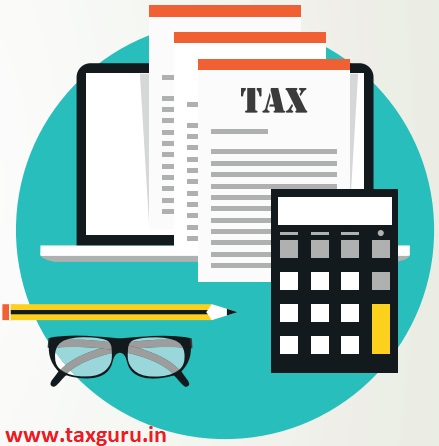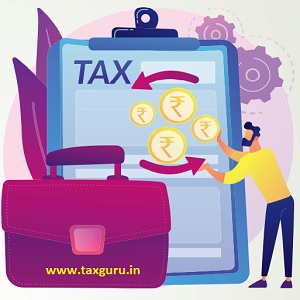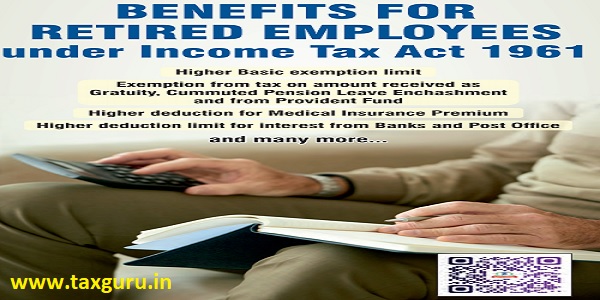BENEFITS FOR RETIRED EMPLOYEES under Income Tax Act 1961
Higher Basic exemption limit
Exemption from tax on amount received as Gratuity, Commuted Pension Leave Enchashment and from Provident Fund
Higher dedication for Medical Insurance Premium
Higher deduction limit for interest from Banks and Post Office
and many more ….
Benefit For Retired Employees under Income Tax Act 1961
I have retired from service after serving for 35 years at an age of 60 years. I am in receipt of various retirement benefits like gratuity, commuted pension, leave encashment, GPF etc. I have a lot of questions regarding taxability of these benefits in my hands to which I seek answers.
 What is the Basic Exemption Limit for Retired employees like me under IT Act, 1961? Is the Pension received after retirement taxable ?
What is the Basic Exemption Limit for Retired employees like me under IT Act, 1961? Is the Pension received after retirement taxable ?
For ordinary individual tax payers the basic exemption limit, upto which he is not required to pay any tax is presently fixed at Rs. 2.50 lakhs for A.Y. 2020-21. However, for Retired employees who are also Senior Citizens between 60 and 80 years of age, the basic exemption limit is fixed at a higher figure of Rs. 3 lakhs. For super senior citizens who are above 80 years of age, the exemption limit is set at Rs. 5 Lakh. The pension received by you is taxable under the Income head ‘Salaries’ beyond the exemption limit.
Will I get benefits of Standard Deduction ?
From AY 2020-21, a standard deduction upto Rs. 50,000 against salary income earned during the year has been introduced u/s16 of IT Act, 1961. A retired employee above 60 years of age who is in receipt of pension income from his former employer can claim a deduction up to Rs. 50,000/- against such salary income.
Am I exempt from payment of advance tax?
Every person whose estimated tax liability for the year is Rs.10,000 or more, is liable to pay advance tax. However, a retired employee above 60 years of age need not to pay any advance tax, provided he does not have any income under the head “Profits and Gains of Business or Profession “.
What are the tax rates applicable to me for AY 2021-22 ?
In respect of AY 21-22, you can opt for either old or new tax regime as under:
Income tax rate slabs for senior citizens
from 60 to 80 years of age
| Income Slab | Income Tax |
| Upto 3,00,000 | Nil |
| Above Rs. 3,00,000/-to Rs. 5,00,000/- | 5% (if taxable income is upto Rs. 5 lacs, the tax liability is Nil on account of tax relief u/s 87A. |
| Above Rs. 5,00,000/-to Rs. 10,00,000/- | 20% |
| Above Rs. 10,00,000/- | 30% |
| Surcharge (subject to Marginal Relief) | If taxable income is more than 50 lacs (then percentage vary from 10% to 37%) |
| Health & Education Cess | 4% of (income Tax + Surcharge). |
Income Tax slabs for super senior citizens
(80 years and above in age)
| Income Slab | Income Tax |
| Upto 5,00,000 | Nil |
| Above 5,00,000/- to Rs. 10,00,000/- | 20% |
| Above Rs. 10,00,000/- | 30% |
| Surcharge (subject to marginal Relief) | If taxable income is more than 50 lacs (then percentage vary from 10% to 37%) |
| Health & Education Cess | 4% of (income Tax + Surcharge) |
New Personal Income Tax Regime
| Income Slab | Income Tax |
| Upto 3,00,000 | Nil |
| Above Rs. 3,00,000/-to Rs. 5,00,000/- | 5% (Tax rebate u/s 87A is available) |
| Above Rs. 5,00,000/-to Rs. 7,50,000/- | 10% |
| Above Rs. 7,50,000/-to Rs. 10,00,000/- | 15% |
| Above Rs. 10,00,000/-to Rs. 12,50,000/- | 20% |
| Above Rs. 12,50,001/-to Rs. 15,00,000/- | 25% |
| Above Rs. 15,00,000/- | 30% |
| Surcharge (subject to Marginal Relief) | If taxable income is more than 50 lacs (then percentage vary from 10% to 37%) |
| Health & Education Cess | 4% of (income Tax + Surcharge) |
Is the Gratuity received by me on retirement exempt from tax ?
Yes. The gratuity received on retirement is exempt under following conditions:
(i) Any death cum retirement gratuity received under the revised Pension Rules of the Central Govt. or Central Civil Service Pension Rules, 1972.
(ii) Any gratuity received under the Payment of Gratuity Act, 1972 to the extent does not exceed an amount calculated u/s 4(2) and 4(3) of that Act.
(iii) any other gratuity received by an employee on the retirement or on termination of his employment or received by his widow, children or dependents on his death to the extent provided therein.
(Section 10(10) of the IT Act, 1961)
Is the amount received by me on Commutation of Pension exempt from tax ?
Yes. The amount received on Commutation of pension is exempt under following conditions:
(i) any payment in commutation of pension received under the Civil Pension (Commutation) Rules of Central Govt. or under any similar scheme.
(ii) any payment in commutation of pension received under any scheme of any other employer to the extent provided in the Income Tax Act, 1961.
(iii) any payment in commutation of pension received from a fund under clause 23AAB i.e. Fund set up by LIC on or after 1st August, 1966.
(Section 10(10A) of the IT Act, 1961)
Is the amount received under Leave Encashment exempt from tax ?
Yes. The amount received on Leave Encashment is exempt under following conditions:
(i) any payment received by an employee of the Central Govt. or a State Govt. as the Cash equivalent of the leave salary in respect of the period of Earned Leave at his credit at the time of his retirement (whether) on superannuation or otherwise.
(ii) any such payment (as given in para (i) above) received by an employee other than employee Central or State Govt. in respect of so much of period of EL as does not exceed 10 months calculated on the basis of the average salary drawn by the employee during the period of 10 months immediately preceding his retirement.
(Section 10(10AA) of the IT Act, 1961)
Is the amount received from a Provident Fund exempt from tax ?
Yes. The amount received from a Provident Fund is exempt from tax (when the Provident Funds Act, 1925 applies or payment is from any other Provident Fund set up by the Central Government and notified by it on this behalf in Official Gazette). Also the accumulated balance due and becoming payable to an employee participating in a recognized provident fund to the extent provided in rule 8 of Part A of 4th Schedule.
(Section 10(11) & 10(12) of the IT Act, 1961).
Is the amount received from a Superannuation Fund exempt from tax ?
Yes. The amount received from an approved superannuation Fund is exempt from tax subject to certain conditions.
(Section 10(13) of the IT Act, 1961)
What is the deduction limit for Medical Insurance Premium ?
From AY 2020-21, the maximum limit for deduction u/ s 80D in respect of payment made for health insurance premium in respect of a retired employee above 60 years of age has been allowed at Rs.50,000/- . Deduction upto Rs. 50,000/- is also allowed for medical expenses incurred on the health of a Senior Citizen provided no amount is paid for health insurance of such person. For claiming this deduction, it is mandatory that the health insurance premium/ medical expenses are paid by any mode other than cash.
What is the deduction limit in respect of Medical Treatment ?
In case you have paid any amount during the financial year 2018-19 (relevant to AY 2019-20) or after that period for medical treatment of specified disease or ailment and you are a senior citizen, you can claim as deduction an amount of Rs. 1,00,000/-from your income.
(Section 80DDB of the IT Act, 1961)
Can you tell me the deduction limit for interest earned from Bank and Post Office in my case ?
Individual taxpayers other than senior citizens are allowed maximum deduction of Rs. 10,000 u/s 8OTTA in respect of interest income from saving bank accounts. However, from AY 2019-20 onwards, a retired employee above 60 years of age can claim deduction upto Rs. 50,000 u/s 80TTB in respect of interest income earned on not only savings bank accounts but also on interest income earned on any bank deposits or any deposit with post office or cooperative banks. Further, if such interest income earned by him during the year is less than Rs. 50,000, the payer bank/ post office will not deduct any tax from such interest income
Can you enlighten me on income tax provision on Transfer of Capital asset under ‘Reverse Mortgage Scheme’ ?
The transfer of a residential house property by way of a reverse mortgage as per the Reverse Mortgage Scheme made and notified by the Central Government for senior citizens, is not liable to be taxed as Capital Gain (nor under any other head of income).
Tax on Family Pension- Family Pension is taxed under the head “income from the Source.”
Family pension paid as regular monthly income (uncommuted pension) by the employer to a family member of an employee in the event of his/her death. Family pension is taxable after allowing a deduction of 33.33% or Rs. 15000, whichever is less.







How a structured product matured value (in the form of a fixed income bond) and bought back before redemption is treated under income tax?
I retired in June 2021. Now I am not employed anywhere. I got arrears from my company in form of annual cash bonus of Rs.3lakhs in Aug 2022. I am also getting monthly pension of around Rs.5500 from LIC from the uncommuted superannuation funds. How these incomes are treated under IT Act and under what head is these income reported for AY 2023-24?
i received a lumpsum as arrears for the past 14 years, for family pension. what tax will i have to pay for this? please let me know
I have retired from defence service at the age of 57 years on superannuation, whether am I eligible for tax benefits as in the case of retired persons at the age of 60years?
Can anyone enlighten about name of employer & TAN to fill up in ITR-2 for retired Govt personnel receiving pension from Nationalised Banks?
I retired on 30th September 2019.
As full leave encashment eligible for tax exemption, but could not claim upto 31.3.2021. now how can i claim my refund from IT Deptt. for leave encashment tax.
These type of relevant and useful informations are very much helpful at this juncture! Thank you. Keep it up.
THERE IS LACK OF INFORMATION BETWEEN PSU , PVT. & CENTRAL/STATE GOVT. EMPLOYEE ON LEAVE IN ENCASHMENT ON RETIREMENT. I THINK THERE WAS SEALING IN EXEMPTION FROM INCOME TAX ON EARN LEAVE ENCASHMENT UP TO RS.3 LAC TO PSU/PVT CO.EMPLOYEE
Informative
Thank you
Thanks. Very useful information and compact. I retired recently and the info has come handy. Cheers…
A clear and vivid enlightenment about income tax deductions for senior and superseniors
Very good article. Very clear. I had transferred my retirement benefits in my wife’account. Her earning is only from bank interest. Is she entitiled for standard deduction and tax exemption limit of 50000 and medical expenses deduction.
I retired 20 years ago from a FMCG MNC and keep myself updated on Income Tax rules as per Budget passed passed by Govt. every year. However, the entire bunch of benefits described at one place that too on very simple language is a very good effort to educate retired seniors on this important aspect.
Very good and usefull information to senior citizens. Small article clears all relevant doubts. Thanks.
I am a retired bank employee. The amount of leave encashment is fully taxable or any limit is fixed for ban employees.If it is fully exempted please give the section and other rules of income tax act.
Thanks.Very nise ingormation for retired employees.
Beautifully explained with an eye to senior Pensionary person.
Leave encashment for Bank employee is taxable or not? If yes what is the limit of non taxable amt?
Whether employee in public sector such as State Bank of India are fully exempted on superannuation on full leave encashment amount ( equivalent to say 8 months salary)
Please lets know as it is not clearly mentioned anywhere and confusion exists.
I am paying Rs.5000/- p.m. approximately towards purchase of medicines for sugar, blood pressure and heart ailments based on doctor’s prescription. Can I claim rs.50000/- under medical expenses. I am not covered under any
medicalinsurancee scheme. Pl clarify.
–
I received payment of diffencial salary w.e.f.07.1981 to 31.05.2005.on .23.03.2009 Rs300000 after court judgement.I was retired on 31..05.2005.The government deducted TDS on this amount but it was not taxable if paid in due time.case is pending in court.kindly help.
Very good and useful information. Thanks
Thanks for your it benifit but 1small dout regarding leave encashment limit rs 300000.is it
Very nice information . Thanks.
Very nice information. I am not knowing the full details, but by this article I have understood in detail. Any way thanks for this article.
useful info